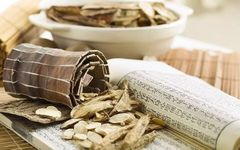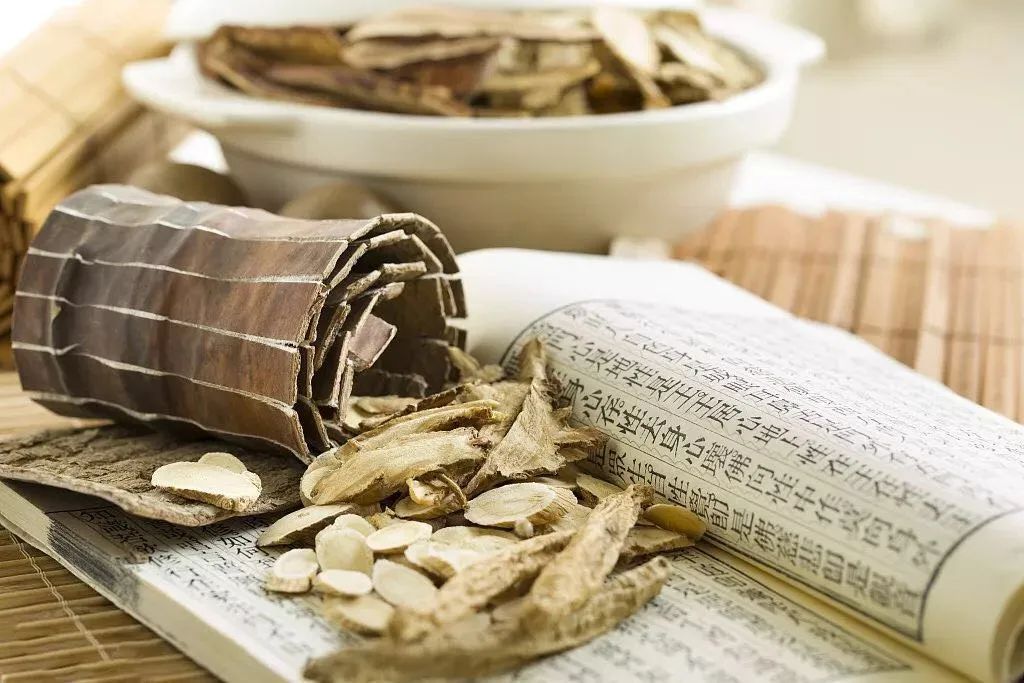


Known as the “King of Tonics”, Astragalus (Huang Qi) has been praised by Wang Haogu for its ability to treat the “three jiaos” (upper, middle, and lower) both internally and externally. But what is the mechanism behind this? The external application of Astragalus is rarely used, yet its effects are astonishing. Teacher Hu Hao succinctly analyzes the characteristics of this great tonic, making one feel that hearing just a few words from him is worth more than ten years of study.


 1. Characteristics and Properties of the Herb
1. Characteristics and Properties of the Herb

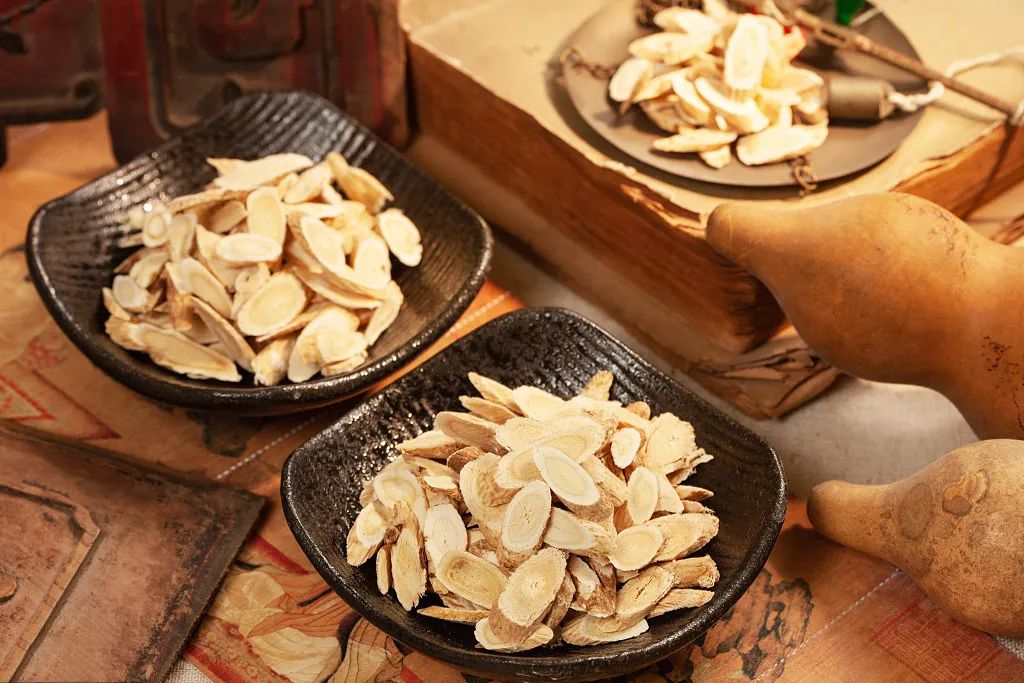
Astragalus is the dried root of the leguminous plant Astragalus membranaceus or Astragalus mongholicus. Its roots are straight and long, cylindrical in shape, measuring approximately 20 to 50 centimeters in length, typically harvested in late autumn, though spring harvesting also occurs.
The exterior of Astragalus is white while the interior is yellow. In terms of symbolism, white corresponds to metal and yellow corresponds to earth, thus it can be understood that the white color enters the lungs and the yellow color enters the spleen. In terms of taste, it has a sweet flavor and a bean-like aroma, and it is of a warm nature.
Its straight growth resembles the Zhen hexagram, which represents the east and can promote Yang energy. This entire representation can be understood as a medicinal symbol indicating that it can tonify the Qi of the lungs and spleen while also promoting Yang, which is its function.
When discussing its functions and indications, we can summarize it as warming and tonifying the Yang Qi of the spleen and lungs, thus replenishing the Qi of the lungs and spleen while also promoting Yang. This is its main characteristic.
Astragalus belongs to the category of “moistening transformation” in the five major classifications of herbs by Zhang Yuantong. In TCM Internal Medicine, Li Dongyuan mentions in his works such as “On the Spleen and Stomach” and “On Differentiating Internal and External Injuries” that “when the spleen and stomach are injured, hundreds of diseases arise.”
The “Neijing” also states, “Human beings rely on the Qi of the stomach as their foundation,” and all organs depend on the Qi of the stomach for their vitality. Therefore, when the Qi of the spleen and stomach is deficient, it can lead to various issues in other organs.

 2. Effects of Astragalus
2. Effects of Astragalus

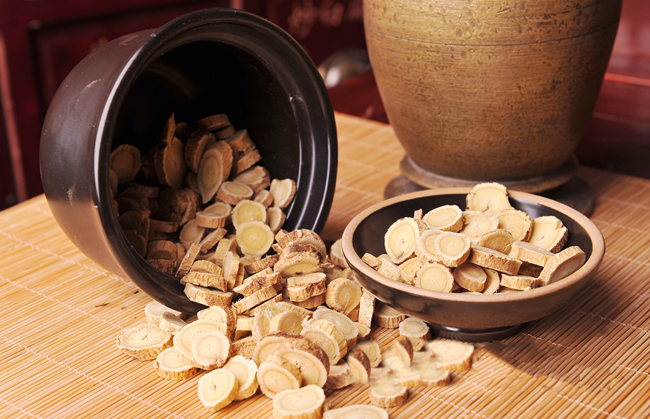
Astragalus acts on the heart by tonifying the Qi of the lungs and spleen, indirectly affecting the heart.
Why does it have an effect on the heart? Because it tonifies the Qi of the upper jiao, which has the function of circulating through the heart meridian and facilitating respiration, thus it has a beneficial effect on the heart. Clinical studies have found that Astragalus can enhance myocardial contractility and elevate blood pressure, which is its effect on the heart.
From the perspective of the five elements, it is generally said that fire can overcome metal, but conversely, metal also has a positive effect on fire. The relationship between heart fire and lung metal can be likened to the relationship between a car engine and a water tank. The water tank represents the lungs, while the engine represents the heart. It is essential to achieve a balance; the heart continuously beats and generates heat, and the question is how to cool this heat? The lungs, as the water tank, can circulate to cool it down. This is a metaphor worth pondering.
Additionally, tonifying the Qi of the spleen and stomach can indirectly assist the liver and gallbladder in generating Yang Qi from the east. This is the famous Yang Dan decoction method, which includes variations such as Xiao Yang Dan, Zheng Yang Dan, and Da Yang Dan. Da Yang Dan consists of Astragalus combined with Gui Zhi (Cinnamon Twig), resembling Huang Qi Jian Zhong Tang (Astragalus and Ginger Decoction) with Ren Shen (Ginseng). Da Yang Dan has a strong uplifting power and can treat various conditions of liver and spleen Qi and blood deficiency, where the uplifting power is insufficient, leading to many symptoms.
Astragalus acts on the kidneys, as the sufficient lung metal can generate kidney water. When kidney function is abnormal, the most common issue is difficulty in urination. In severe cases, patients may experience kidney failure, oliguria, proteinuria, edema, or even anuria.

 3. External Application of Astragalus through Fumigation
3. External Application of Astragalus through Fumigation

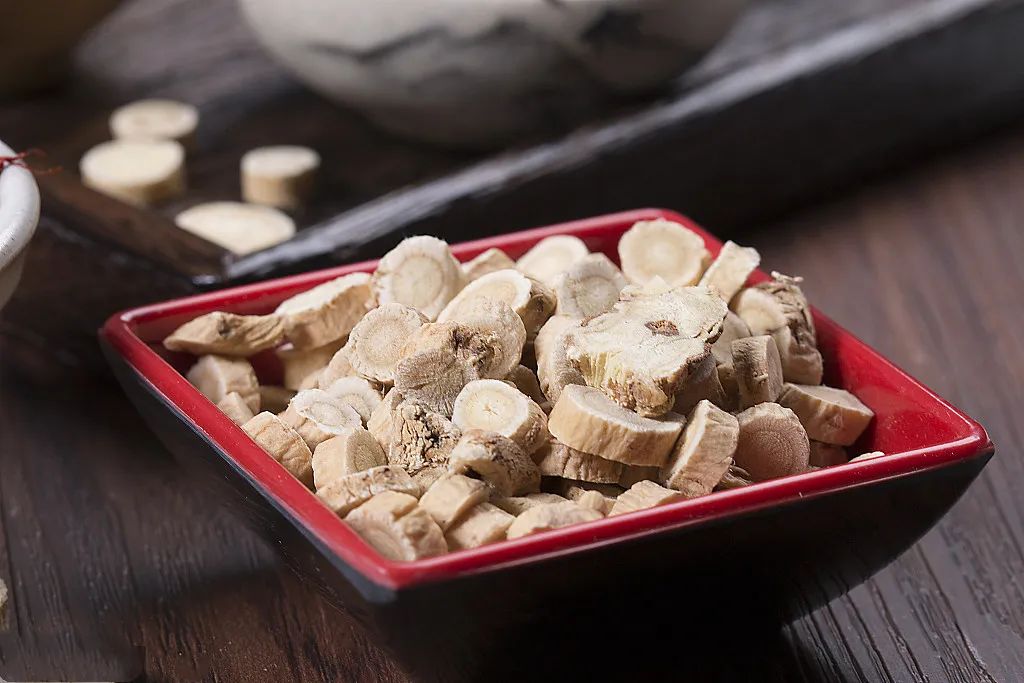
Clinical research has found that Astragalus is a very suitable medication for treating kidney failure. How is Astragalus used clinically? Generally, Astragalus is more commonly taken internally, usually boiled in soup. However, throughout history, there have been records of external applications of Astragalus, particularly fumigation methods, documented in texts such as “Ancient and Modern Medical Cases”, “Famous Physician Cases”, and “Medical Sayings”.
Case 1:
Xu Yinzong treated Empress Liu, who suddenly could not speak due to wind invasion, with a pulse that was deep and tight. Many doctors were at a loss. The empress was unable to speak, her jaw was tightly closed, and she could not take medicine. Other doctors did not know what to do, and then Yinzong said: “If medicine cannot be taken orally, it should be steamed with the vapor of the soup, allowing the medicine to enter the pores, and she can recover in due time. Thus, he prepared a Huang Qi Fang Feng Tang (Astragalus and Siler Decoction).”
This consisted of Astragalus and Fang Feng (Siler), boiled in a large quantity of water placed under the bed, creating a vapor like smoke to fumigate her, and the next day she was able to speak. After fumigating for a day and night, she woke up and could talk.
This is a very classic medical case, listed as the first case in “Famous Physician Cases”. This case has had a significant impact on later generations.
Case 2:
It is recorded that during the early years of the founding of the nation, Xu Te Li’s wife had a similar condition, often suddenly fainting and regaining consciousness after two or three days without any special events. Western medicine diagnosed it as hysterical fainting, and many renowned doctors from both Chinese and Western medicine could not cure her.
The principle of simplicity is the law of development for all things in the universe, the essence of Chinese culture, and the philosophy of Daoism. The principle is so simple that it can be explained in a few words. The saying “True transmission is one sentence, false transmission is thousands of volumes” comes from Laozi’s “Dao De Jing”. The principle of simplicity is not only valued by philosophical schools such as Daoism and Confucianism but also represents a state of life in the world.
The principle of simplicity is profound yet simple; it is a state of naturalness, returning to simplicity. In this state of tranquility, selflessness, and unity with nature, one does not seek to cultivate power, and the power naturally increases; one does not seek to heal, and the body and mind naturally adjust; one does not seek function, and the function naturally manifests; one does not seek to open the microcosm, and the meridians naturally flow. The deepest truths are the simplest and most ordinary truths. Transforming the most complex into the simplest is the highest wisdom. The greatest people appear noble simply because of their simplicity.
The principle of simplicity applies to life as well. Enlightenment makes the profound simple, and simplicity makes the profound. From seeing a mountain as a mountain to seeing a mountain as a mountain, the realm is different. From simplicity to complexity, and then from complexity back to simplicity, is sublimation. The meaning of life lies in simplicity; when a person cultivates to a certain extent, they will become indifferent to many things and live simply. You can understand others, but others may not understand you. In fact, it is not about understanding but about recognition.
Being meticulous in heart and simple in form. Questioning the soul is the ultimate question of humanity. Simplicity is not only a form of beauty but also a capability and a realm. Seeing through without revealing, high realm; seeing vaguely, heart transparent; knowing without knowing, intentionally not seeing through, is truly thorough; knowing that worldly matters cannot be seen through is transparency. The clarity after confusion, the understanding after misunderstanding, and the difficulty of being muddled is the true realm.
The principle of simplicity is the wisdom of being human. To do things, one must simplify complex matters, which requires wisdom. Returning complicated matters to simplicity requires wisdom, ability, and determination. Wise people appreciate the principle of simplicity, thus, one should not chase after fame and profit; one should not be burdened by reputation and wealth. Being indifferent clarifies one’s aspirations, and tranquility leads to far-reaching goals. We should live simply and work diligently, using wisdom to simplify the difficult.
For the sake of fame and profit, one should cast aside praise and blame, remaining pure like a child’s innocent virginity, and simple like the fertile soil cultivated by ancestors. Only those with a calm heart can see the leisurely scene of “the setting sun shining on the village, the cattle and sheep returning home” and hear the heavenly sounds of “the lotus breeze sending autumn air, the bamboo dew dripping clear sounds” and feel the emptiness of “the empty mountain has no one, but the sound of people talking”. Tao Yuanming was such a person, which is why he could compose the couplet “Picking chrysanthemums by the eastern fence, I leisurely see the southern mountain”; Ouyang Xiu was also such a person, which is why he could write “The Drunken Old Man Pavilion” with ease even during his exile.
The principle of simplicity applies to life as well. Simplicity is not material poverty but spiritual freedom; simplicity is not life’s emptiness but the purity of the heart. The principle of simplicity is that the highest truths are often the simplest. People should learn to live simply, act simply, and let go of selfish thoughts, transcending the cage of self-desire, entering a state of forgetting oneself and forgetting things.
Life’s complexity arises from confusion; using “benevolence” to resist temptation and “wisdom” to resolve confusion. Not being confused is a sign of moving from complexity to simplicity in life. With the vast waters, I only take a ladle to drink; in the myriad forms of life, one must remain steadfast. Joyfully forgetting worries, simply preserving truth, is the “great principle of simplicity” in life.
There is a story about the principle of simplicity and a peaceful heart: a traveler asked an old Daoist priest, “What did you do before you attained the Dao?” The old Daoist replied, “Chopping wood, carrying water, and cooking.” The traveler asked, “And after attaining the Dao?” The old Daoist replied, “Chopping wood, carrying water, and cooking.” The dialogue between the old Daoist and the traveler enlightens us that many profound truths are contained in extremely simple thoughts.
The principle of simplicity applies to life as well. A thousand people have a thousand ways of living and paths in life. After walking through the years and life, one has many feelings. Let go of everything, and be free; let go in the present moment, and be free. Many problems in life do not need to be held in the heart, and many burdens in life do not need to be carried on the shoulders. Only by letting go of a thought can one feel the joy of simple living and the exhilaration of a soaring spirit. To change some things, one must first find oneself. We all have latent energy, which is easily covered by habits, obscured by time, and worn down by inertia. We should remember what should be remembered, forget what should be forgotten, change what can be changed, and accept what cannot be changed. We should face the past with the least regret, the present with the least waste, and the future with the most dreams.
The way of heaven and earth is simple and easy. Life is short; do not complicate everything. Live simply. Once the grand play of life begins, no matter how nervous you are, you must perform until the end. The greatest challenge in the process of growth is that some paths can only be walked in silence. Joyful work and simple living are the keys to a happy life. One must understand that contentment brings happiness. All sorrow and pain, all things that cannot be given up, are merely transitions in life. Once you jump over them, you can become more wonderful.
The best life is a simple life: a cup of tea, a table, a quiet place, plain days, and a heart free of distractions. However, a simple life requires tremendous effort to enjoy life without worries. Overall, life is perfect; it is the mindset that is imperfect. Those who do not know how to appreciate will turn everything into flaws through criticism. Live simply, act naturally, grasp the measure, adapt to circumstances, and accept reality calmly; do things simply, do not provoke trouble, do not create issues, do not fear problems, do not regret, do not complain, and do not begrudge what you have done.
Life is a long struggle; some people smile at the beginning, while others win in the end. Try to smile, try to look back, relax yourself, do not force, do not be weak, do not be restless. Live simply, follow your heart, follow your nature, and follow your fate. Be the best version of yourself, be content, smile, and remain calm. Even if it is bitter and tiring, as long as you persist in moving forward, your own scenery will eventually appear.
Whether life is easy or not depends on how you live. Circumstances depend on mindset; when the mindset changes, the circumstances will change. The more you demand from life, the more tense and complex you will become, making life harder. Conversely, the less you demand from life, the easier it is to be satisfied and happy. The mountains and bright moon have no permanent master; being free is being the master. The principle of simplicity is to live in the present; being content can lead to lasting happiness.
Entering the tranquil state of no worries, a heart like a bright moon reveals the realm of a calm heart; a calm heart naturally exudes charm. In life, simplicity is the truest, silence is the most beautiful, and the most enduring in life is not prosperity but simplicity, not noise but quiet joy. Maintain a childlike heart; when unhappy, freely confide in friends about your troubles; when happy, laugh heartily without restraint. Perhaps all worries will flow away in the act of sharing, and all tension will be released in laughter. Live simply like a child, live happily, and maintain the original ecology of the heart; everything is beautiful.
In life, there is always a story that is hard to tell, gradually composing a melody in the heart. People are like this; what they cannot obtain, they will always yearn for, and what they have lost will be felt as precious. So-called gains and losses, relationships, scenery, and way stations all gradually fade in the dust of time. Although letting go of some things is difficult, what does not belong to you will eventually drift away.
A person’s life is destined to experience much. On the road of the mundane world, there are bright laughs, tears of grievance, naive persistence, confidence in success, and warnings from failure. Every experience is precious. The richness of life comes from the compassion of the heart, and the beauty of life comes from having a peaceful heart. A simple life brings ease and joy, and simple thoughts bring peace and tranquility. Because of simplicity, one deeply understands the lightness of life; because of simplicity, one perceives the tranquility of the heart.
Later, I encountered the old TCM doctor Peng Chongrang. After examining her, he said, “Let me try a prescription,” and prescribed one tael of Astragalus and five qian of Fang Feng, decocted and administered via nasal feeding. In the past, nasal feeding was not possible, but now we have the conditions to administer medication this way. As a result, after drinking it, the lady immediately woke up. Xu Te Li was particularly curious and asked, “Who did you learn this method from?”
Old Peng said, “This condition is very simple; it is recorded in the “Records of the Grand Historian: The Biography of Bian Que” that Bian Que saw the Duke of Jin, who had a condition called ‘corpse convulsion’. Your wife has the same condition, called ‘corpse convulsion’. This condition has existed from ancient times to the present. I merely learned an old prescription from the ancients, putting new wine in an old bottle. Therefore, it is effective now.”
As you can see, this method was also used in the TV series “The Great Doctor Xilai Le”.
The external application of Astragalus is very miraculous. In clinical practice, we often treat kidney diseases, especially the aforementioned kidney failure and uremia. Some patients have difficulty swallowing internal decoctions for a long time, or the decoctions may adversely affect the liver and kidneys due to their circulation. Therefore, the fumigation method of administering medication through the skin can be boldly attempted.
Some practitioners use Astragalus combined with Da Huang (Rhubarb), along with Yi Mu Cao (Motherwort), and depending on the situation, can also add Fu Zi (Aconite). After boiling the soup, it is used for fumigation, and administering medication through the skin can achieve excellent results. This is its application.

 4. Indications for Use
4. Indications for Use

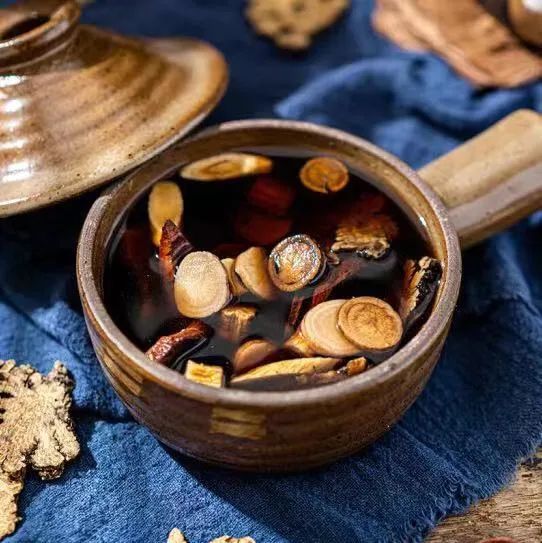
In terms of tongue diagnosis, the patient’s tongue may have a depression in the middle and the anterior third. This is a typical tongue manifestation, characterized by a collapsed shape, with a depression in the middle or slightly at the front, observed when the tongue is relaxed.
In terms of pulse diagnosis, the patient’s right cun pulse may be weak and lacking strength, which we can refer to as a “headless pulse”. If the patient also has blood deficiency in the liver and gallbladder, and Yang Qi is not rising, the left cun pulse may also be weak, though this is not always the case. Typically, the right cun pulse is weak, which is its typical indication for use.
The above is for reference only; please adjust under the guidance of a physician.
Reviewed by: Pharmacist Lu
Edited by: Sanqi Xiaomei
Return to the main pageReply with any keywords
to view the corresponding articles
| Back Diagnosis | Face Diagnosis | Tongue Diagnosis | Sweat Diagnosis | Eye Diagnosis | Differentiation |
| Gua Sha | Cupping | Moxibustion | Acupressure | Foot Therapy | Meditation |
| Patting | Stretching | Veins | Nails | Acne | Stones |
| Liver Cirrhosis | Home Feng Shui | Sanfu Paste | Vinegar Soaked Eggs |
| Wonderful Tips | Tests | Treating Winter Diseases in Summer | Self-Healing |

